Contest conducted by Marc Smith
After eight months, only 7 points separate the top six contenders on the 2025 annual competition leader-board. This is the last month before players can begin discarding their weakest scores, so those at the top still need to keep one eye over their shoulders.
Two of those six are here as guest panelists, having produced perfect 80/80 scores to win the July competition. Based in Bengaluru, India, Venkatesh Ramaratnam took early retirement from the IT industry. He began playing 30+ years ago, and represented India in the World Junior Championships in the late 1990s. He has subsequently won numerous national titles, and he has also held numerous posts including coach, commentator, director and administrator. This is Venkatesh’s second perfect score this year, having also hit that mark in the February competition. Australia’s Alexander Cook has been playing competitive bridge for around 20 years. He is a versatile bidder, playing four systems with four partners - Standard American, 2-over-1, a strong club variant based on the original Polish Club; and Standard Modern Precision. He is a perennial contender in the Australian Bridge Magazine bidding forum and he is also a former winner of our annual competition.
Those of you who appreciate the insightful and often quirky observations by one of our regular panelists, Joey Silver, will surely enjoy his new book: Confessions of a Bridge Addict.
Joey and John Carruthers have been leading lights in Canadian bridge for over fifty years. As a partnership, they have a world championship silver medal and numerous Canadian titles to their credit. This book continues Joey's popular Confessions of a Bridge Addict column, begun on Bridge Winners during COVID. It showcases his successes and failures, both at the bridge table and in life. Interspersed throughout are stories of his exploits as a lawyer in the Québec court system, in which he meets an array of personalities and finds his passion for competition. The lessons learned as a public defender mirror those learned at the bridge table, which he now shares with his readers. The result is a book that delivers a unique insight into the game, and many of its interesting characters.
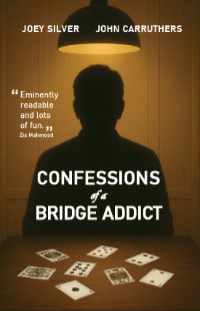
Hand 1 this month comes from panelist David Bird, whilst Hand 4 was sent to me by two regular competitors, Pete Law and Patrick Shields. Thanks to them all. If you have a hand that you think would make an interesting problem for the panel to discuss, please send me the details.
The panel produce a majority vote on four of the hands in this set. It really goes to show that some hands are just too difficult, as the panel twice vote strongly in support of a choice that would have worked out badly at the table. Regular mortals can take comfort that even the very best players get some hands gloriously wrong. With a score of 77/80 topping the panel, can anyone out there outscore all of the experts on this set?
The most popular action chosen by the competition entrants scores ‘10’ on four of the eight hands, and voting with the largest group of competitors this month scores a very creditable 68/80 (up from 60/80 in August). The average score this month is 54.87 (just down from 55.27 on Set 25-08). Let’s see what the panel has to say about this month’s hands…
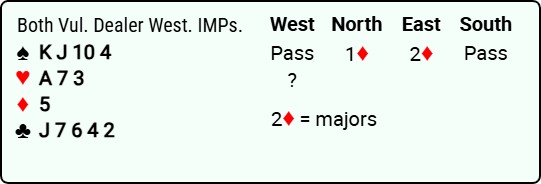
|
ACTION |
MARKS |
PANEL |
Competitors' |
|
4♦ |
10 |
17 |
8 |
|
3♦ |
7 |
2 |
8 |
|
4♠ |
5 |
4 |
29 |
|
3♠ |
2 |
0 |
28 |
|
2♠ |
0 |
0 |
21 |
|
Pass |
0 |
0 |
3 |
|
2NT |
0 |
0 |
2 |
|
3♣ |
0 |
0 |
2 |
Competition Entrant Average Score: 3.37
We start with a matter of hand evaluation that turned out to be by far the toughest deal of the set for competition entrants. There is a big majority vote from the panel, but their choice gains the support of barely only one competitor in twelve. Nearly a third of competition entrants opt for the panel’s conservative choice, and almost as many choose a huge underbid that was not even considered by any panelist. Indeed, 3♠ gets a token 2 marks as it was not quite as much of an underbid as the 2♠ chosen by the third-largest group of competitors. Let’s start with those panelists supporting the competitors’ choice…
PAUL MARSTON: 4♠. This seems clear. No reason to mess around.
P.O. SUNDELIN: 4♠. It is too tricky to investigate possible slams.
DAVID BIRD: 4♠. Anything more fancy would rarely result in a slam, and might give important information away.
LARRY COHEN: 4♠. If there is a slam, partner likely has a hand with which he can bid again. Meanwhile, I want to take up space to prevent the opponents from finding a 5♦ sacrifice.
A couple of panelists opt to start by establishing a force…
MATS NISLAND: 3♦. I will try to show a maximum for spades in case we have a slam.
HANOI RONDON: 3♦. I want to show strength and leave space for more exchange, in order to try for slam. A 4♦ splinter is another alternative, but it leaves us a little endplayed as we have not yet set a trump suit.
You can see how this might work if the auction continues 3♦-3♥-3♠-4♣-4♦-4NT-etc. Having created a game-force, 3♠ sets trumps and, after a couple of cue-bids, partner can roll out Blackwood.
Having originally passed as Dealer, the majority prefer a more straightforward approach…
MARTY BERGEN: 4♦. This is a passed-hand "on the house" splinter, in case North bids 5♦ or we have a slam.

VENKATESH RAMARATNAM: 4♦. I play advancer's 3♣/3♦ (my second choice) here to show a limit raise in hearts/spades respectively. (Wouldn’t a jump to 3♠ show an invitational raise of spades? MS) However, I think a 4♦ splinter is the best option as I have a double fit and all working/offensive values. Having passed initially, my hand is limited to a narrow range, and 4♦ leaves the partnership best placed for any five-level decisions.
WENFEI WANG: 4♦. Showing a singleton and a good fit.
CHRISTIAN MARI: 4♦. This splinter could be useful information for partner.
ALAN MOULD: 4♦. It isn't hard to see that we could have a slam on.
BARNET SHENKIN: 4♦. Partner could be strong, so I tell him that I am suitable.
ALEXANDER COOK: 4♦. Maybe partner has a club void, in which case slam will be on.
JILL MEYERS: 4♦. This is a slam try in at least one major. Can partner have ♠A-Q, ♥K-Q and first round club control? Why not?
MIGUEL VILLAS-BOAS: 4♦. On a lucky day, my partner will have 5-5-3-0 shape or 5-5-2-1 with a minor-suit ace.
Some are aiming even higher…
ROB BRADY: 4♦. Slam try. Maybe partner has the perfect Axxxxx/KQxxx/Ax/-- and we can reach our grand.
Some comment on what comes next…
LIZ McGOWAN: 4♦. Splinter. The real problem arises when partner bids 4♥.
Most think they will have done enough…
SALLY BROCK: 4♦. Then 4♠ over 4♥.
JOEY SILVER: 4♦. My hand is just too good to give up on slam, but this is the extent of my labours.
PIERRE SCHMIDT & JOANNA ZOCHOWSKA: 4♦. It's likely that our partner has a singleton, or even void, in clubs. We can't discard the possibility of a slam. If he bids only 4♥, we will give him another chance (4♠) to judge his hand.
A man who had the hand at the table thought otherwise…
ANDREW ROBSON: 4♦. I have a HUGE hand and, if I recall, at the table I virtually drove it to six.
Sartaj raises a potential problem that the 3♦ bidders solved…
SARTAJ HANS: 4♦. If partner bids RKC, I'll respond 5♥. He's smart, he'll figure it out.
What great faith!
SIMON DE WIJS: 4♦. Showing a splinter with support for one of partner’s suits. I would normally prefer to set spades and make a slam try later, but I have no idea how to do that without detailed agreements.
Something for regular partnerships to discuss.
In the match I watched during the qualifying stage of the Open Teams at the world championships in Poznan, one West bid 4♠, the other bid 4♦. Partner had AQxxx/KQJxx/Ax/x, so the 4♦ bidder got his side to the cold 6♠. South eventually saved in 7♦, but that was still +1100 against +680 and a 9-IMP gain. Well judged by most of the panel, but a “could do better” for a large number of competition entrants.
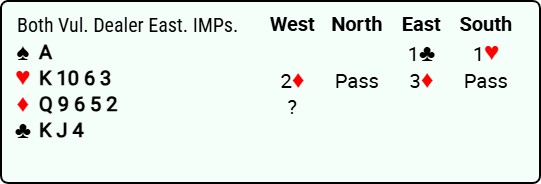
|
ACTION |
MARKS |
PANEL |
Competitors' |
|
3NT |
10 |
19 |
56 |
|
3♥ |
8 |
2 |
14 |
|
4♣ |
5 |
1 |
2 |
|
4♠ |
5 |
1 |
1 |
|
5♦ |
4 |
0 |
11 |
|
3♠ |
0 |
0 |
8 |
|
Pass |
0 |
0 |
3 |
|
4♦ |
0 |
0 |
3 |
|
4NT |
0 |
0 |
2 |
|
4♥ |
0 |
0 |
1 |
Competition Entrant Average Score: 7.31
It really irks me to give top marks to 3NT on this deal, but it was the choice of a large majority of the panel. When I held the hand at the table, it was matchpoints, and thus landing in 5♦ was much less attractive. By changing the conditions to IMPs, I hoped to find out from the panel how to investigate the hand. Thankfully, a couple of panelists did step up to the mark and provide regular partnerships with something to discuss. Apologies to the 14% of competitors who dropped 2 marks for choosing what it seems to me is the best bid. Let’s start with the flock…
SARTAJ HANS: 3NT. I cannot think of any alternative.
SALLY BROCK: 3NT. I can’t really see an alternative. I will read the other answers with interest.
PAUL MARSTON: 3NT. It could be wrong, but it’s a favourite to be right.
ALAN MOULD: 3NT. This is obviously wrong, as it has been presented as a problem, but it looks normal to me.
MIGUEL VILLAS-BOAS: 3NT. This seems like the most viable game to me.
JOEY SILVER: 3NT. I'll try for the nine-trick game, and give up on the eleven-trick game.
MARTY BERGEN: 3NT. With these hearts, this seems like the obvious action.
WENFEI WANG/P.O. SUNDELIN: 3NT.
A few did acknowledge the danger…
CHRISTIAN MARI: 3NT. Partner can have a flat hand (3334 or 4234) with, I hope, something in spades.
SIMON DE WIJS: 3NT. Sure, a spade lead could be problematic, but our first priority is the heart suit, so 3NT feels natural.
LIZ McGOWAN: 3NT. Partner may have the right cards for slam - or not. I have persuaded myself that she will not pass 3NT with an unsuitable hand (i.e. nothing in spades).
Your partners are obviously more clairvoyant than mine, Liz.
HANOI RONDON: 3NT. Usually we will get a heart lead and all will be well. Perhaps partner can help in spades, but I don't quite know how to find out.
David gets to the crux of the matter – something for regular partnerships to discuss…
DAVID BIRD: 3NT. Bidding either major might lead to an asking-or-showing misunderstanding.
VENKATESH RAMARATNAM: 3NT. Opener's 3♦ limits his hand to 11-14 HCP. We have enough values for game and a robust stopper in the opponent’s suit. 5♦ could be better if partner has concentrated values in minors with little in spades, but 3NT seems like the practical option.
JILL MEYERS: 3NT. I have 1.5 heart stoppers, bad diamonds and slowish tricks. If partner has extras she can bid again.
I think 3♦ limits partner’s hand to a minimum as our 2♦ was not forcing to game. Pierre and Joanna agree with that and they also suggest a meaning for 3♥, but is it the right one?
PIERRE SCHMIDT & JOANNA ZOCHOWSKA: 3NT. 3♦ is not forcing for us. Partner may have anything from Kxxx/Jx/KJx/A10xx (we must play 3NT) to xx/Ax/AKx/Q10xxxx (a great 6♣) but sorry, we can't know. For us, 3♥ would ask for a stopper and 3♠ would be natural and unbalanced. Note that, if partner had bid 2♥ rather than 3♦, such a bid would show a weak balanced hand with no heart stopper and no diamond fit... But, with three or more cards in support, partner would always bid 3♦.
LARRY COHEN: 3NT. It is not clear to me that partner has reversed. What would he bid over 2♦ with, say, KQx/xxx/Axx/Axxx?
Indeed, but with that he would then bid 3NT if you bid 3♥ ASKING for a spade stopper…
BARNET SHENKIN: 3NT. If 3NT is right, I need to bid it now.
Do you? See my previous comment.
Rob and Alexander lay the groundwork for a discussion by regular partnerships…
ROB BRADY: 3♥. Showing a stopper and asking about spades. Partner can punt with 3♠ and we can back into our no-trump game. As in most cases where our side has shown two suits, 3♠ here would show spade values and ask for a heart stopper.

ALEXANDER COOK: 3♥. This should show a heart stopper and ask partner to bid 3NT with a spade stopper. I am worried about a spade lead or spade switch.
There were a couple of other mavericks… Might this not take us past the right game if he has something like Larry’s hand above…
MATS NISLAND: 4♣. Difficult hand. If we can make 3NT with a spade lead, we will probably also make at least 5♦.
Andrew puts in an early claim for the “Optimist of the Month” award…
ANDREW ROBSON: 4♠. I am a sucker for a splinter (maybe I can splinter on all eight hands this month). I’ll need partner to drive this one, though, as I’m playing for a bit of a perfecto.
The key question is whether 3♥ should ask for a heart stop, or show one and ask for help in spades. At the table, partner had xxx/Qx/KJxx/AQxx so 5♦ was an easy make. Against 3NT, the defense duly led a heart, but South won with the ♥A and switched to a spade. That was two down without the option. I guess I would have been in good company.
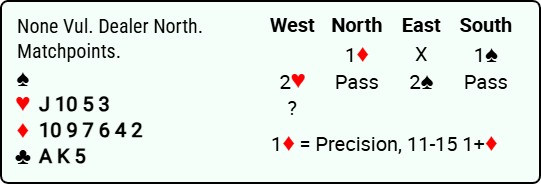
|
ACTION |
MARKS |
PANEL |
Competitors' |
|
2NT |
10 |
11 |
17 |
|
3♦ |
9 |
9 |
42 |
|
3NT |
6 |
1 |
3 |
|
3♣ |
5 |
1 |
13 |
|
Pass |
4 |
1 |
5 |
|
4♥ |
0 |
0 |
11 |
|
3♥ |
0 |
0 |
7 |
|
3♠ |
0 |
0 |
1 |
Competition Entrant Average Score: 6.51
No majority on this one, with the panel essentially split two ways. More than half of competitors opt for one of the panel’s top choices, with most of those preferring the panel’s minority option.
MARTY BERGEN: 2NT. Imperfect, but economical.
JOEY SILVER: 2NT. Is partner's spade bid natural, or does he have a cue-bid in support of hearts? I'll get out of his way with 2NT, and see which way he goes.
Most of the panel agree that 2♠ is natural.
SIMON DE WIJS: 2NT. For me, 2♠ shows a strong hand with 5+♠. 3♦ should be the cue-bid now, so I am bidding 2NT with this and will see what happens next.
Yes, 2♠ is strong, but can we pass? Not down under, apparently…
SARTAJ HANS: 2NT. Partner's 2♠ bid is natural and forcing. 3♦ by me would suggest a balanced hand without a stopper. Thus, an ugly 2NT for now.
ALAN MOULD: 2NT. Hardly unpredictable, given my spade holding. In my world, a free bid (my 2♥) and then this 2♠ bid showing a hand too strong for a 1♠ overcall, sets up a game force, so I will try 2NT. I don't know what 3♦ would mean, and don't care.
Ah, so 2NT is forcing…?
ANDREW ROBSON: 2NT. Warning bells are jangling, but I can’t bring myself to pass and table a trump void when we could have a high-card 3NT.
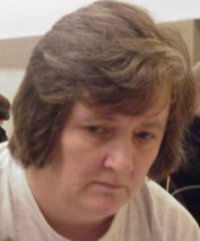
Andrew mentioned passing, but Liz is the only one to take that option…
LIZ McGOWAN: Pass. Partner appears to have a hand too strong to overcall 1♠ last time. We may have enough for game if South has psyched, but I am aiming for a plus score. Best to stop low on misfits.
Sound advice in general, for sure, but is this hand marginally too strong?
HANOI RONDON: 2NT. I sort of stop diamonds, but I don't want to commit to 3NT yet. 3♣ is an interesting alternative, to show 'where I live'.
Sally was a lone voice for that choice…
SALLY BROCK: 3♣. It’s where my values are.
I wonder if you wouldn’t bid this way with something like x/Kxxx/xx/QJxxxx. Isn’t there a risk that partner will let you play a 3-2 fit?
WENFEI WANG: 2NT. 2♠ is a natural bid. 2NT denies a fit and is invitational.
So 2NT is invitational but non-forcing? Another question for regular partnerships to address.
P.O. SUNDELIN: 2NT. A tough guess, but I have too much to pass. Could partner not have something like AKJxxx/Ax/A/Qxxx?
He certainly could – but where do you want to play if he does? 2♠ perhaps?
ALEXANDER COOK: 2NT. This is close between 2NT and 3NT.
That sounds like another vote for a non-forcing 2NT, as does…
VENKATESH RAMARATNAM: 3NT. Intervenor's double followed by bidding a new suit (including the one bid by responder) shows a strong hand. We are maximum for our 2♥ bid, so we have to bid game and 3NT is the obvious choice. 2NT is an alternative if it is played as F1 (more room to explore the right strain after which only intervenor's 3♠ rebid would be non-forcing).
Christian raises the spectre of the main alternative…
CHRISTIAN MARI: 2NT. 3♦ is probably better, but a misunderstanding is possible.
…and the rest of the panel prefer that route.
LARRY COHEN: 3♦. I underbid the first time, and now I am trying to make up for it. This is already a crazy auction, and it is about to get crazier.
JILL MEYERS: 3♦. I am tossing the ball back to partner. He clearly has spades and I have values (although no spades).
The impression I get is that most plan to pass if partner bids 3NT, but Barnet has other ideas…
BARNET SHENKIN: 3♦. And 4♦ next.
Rob poses the $64,000 question…
ROB BRADY: 3♦. Is this natural, artificial, forcing? I don't know, and partner probably won't either. I don't often torture partner with cue-bids but, when we follow up with 3NT over 3M, they should get the idea.
MATS NISLAND: 3♦. 2NT is an alternative, but would usually show a more balanced hand, and I don’t want to encourage partner to bid his spades again.
PAUL MARSTON: 3♦. Why not show my second suit?
MIGUEL VILLAS-BOAS: 3♦. Natural. If my partner bids 3♠, I will continue with 3NT.
What action is most likely to discourage partner from bidding spades again?
DAVID BIRD: 3♦. This must show long diamonds since, with spade support, I could bid 3♠ or 4♠. After any no-trump bid from me, partner may be more inclined to persist in spades.
So, 3♦ is clearly natural…. Or is it?
PIERRE SCHMIDT & JOANNA ZOCHOWSKA: 3♦. Even against a Precision 1♦ opening, we use the diamond suit for cue-bids, never natural. We don't want to bid clubs with three cards only, so let's see what partner bids next, and we will probably then suggest 3NT.
Partner had AKJxxx/AK/Q/QJxx so you are likely to make 3NT via four clubs, two spades and three hearts, although an opening club lead may make entries tricky to manage. 4♠ might also make for the loss of a diamond and two trumps, although it does seem likely that South will have at least Qxxxx (no raise from North, suggesting he does not have three-card support, and no values for South, so he is likely to have some shape to justify his response).
If partner understands our 3♦ bid as natural, he will surely bid 3NT. It also seems likely that he will raise 2NT, so most of the panel seem likely to land in a making game on this tricky combination.
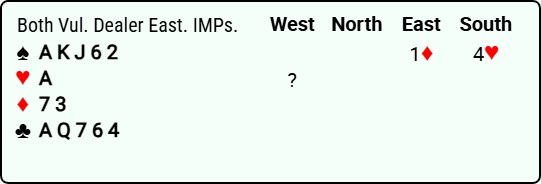
|
ACTION |
MARKS |
PANEL |
Competitors' |
|
5NT |
10 |
7 |
6 |
|
4NT |
9 |
4 |
16 |
|
Dbl |
8 |
7 |
32 |
|
5♥ |
6 |
3 |
19 |
|
4♠ |
4 |
0 |
19 |
|
5♣ |
4 |
2 |
0 |
|
6♠ |
0 |
0 |
2 |
|
5♠ |
0 |
0 |
1 |
Competition Entrant Average Score: 6.50
The panel is widely split on this one. 16-of-23 vote in favour of committing to the five-level (or higher) as opposed to defending if partner cannot bid again, hence the marking. The largest group of competitors, around one third, choose to start with a double, so let’s hear first from their supporters…
PAUL MARSTON: Dbl. Tricky decisions ahead, but let's get the party started.
SALLY BROCK: Dbl. If it gets passed out, I’ll have to hope the penalty is large enough. Again, I’m not sure I really like it, but it’s hard to see an alternative.
ANDREW ROBSON: Dbl. A horrid problem. My first thought was 5NT, but partner may choose his better minor and we will miss 6♠/7♠. At least double avoids a silly result, as getting about +800 against a slam looks like our worst case. And, if partner pulls, we can make grand slam tries in that suit.
WENFEI WANG: Dbl. If partner bids something, I will raise to slam, otherwise I can accept defending 4♥-doubled.
MIGUEL VILLAS-BOAS: Dbl. I run the risk of my partner passing but, if he can speak, it will be easier for the auction to continue. If he passes, they are vulnerable.
ALEXANDER COOK: Dbl. I will bid slam in whatever partner responds. If partner passes, then maybe slam isn't on.
ROB BRADY: Dbl. I am planning to keycard over 4♠, cue 5♥ over 5♣, and offer a choice with 5NT over 5♦. Sometimes partner passes, but I'll take the risk to try and find our best fit.
The rest all choose to move forward. The question is, with what?
ALAN MOULD: 5NT. No idea. I will randomly guess we have a slam on.
SARTAJ HANS: 5NT. Pick a slam. We might be overboard or we might have undercooked it. Such is life – pre-empts work.
MARTY BERGEN: 5NT. Pick a slam. If 4NT was takeout, I'd prefer that economical bid.
So, what is 4NT? Simon clearly thinks it suggests a choice of minors, ergo…
SIMON DE WIJS: 5NT. Pick a slam. This should be spades and a minor, otherwise I would start with 4NT and raise partner once he chooses a minor.

HANOI RONDON: 5NT. I hope this is 'pick a slam' in a black suit. I haven't discussed this with my partner but I suppose it's sort of universal.
DAVID BIRD: 5NT. 4NT sounds more like 'choose a minor'. Whether or not 5NT is an overbid, it will at least give a good picture of my shape.
LARRY COHEN: 5NT. Partner's cards are likely outside of hearts, so I will drive to slam. The only problem is that we won't be able to reach spades. (I will pass if partner chooses 6♦ – although not at all happily.)
So 4NT is pick a minor?
MATS NISLAND: 4NT. I am not sure if we have an agreement about 4NT or 5♥, but I have to do something. 4NT leaves more room.
LIZ McGOWAN: 4NT. I expect partner will know what this means, although I am not sure I do. But I am going for slam. This is a 30-point pack, I have 14 and partner opened. I would not expect more than +500 from 4♥-doubled, maybe less if South has a nine or ten-card suit.
Ten does sound rather pessimistic 😊
BARNET SHENKIN: 4NT. 5♥ sounds like a diamond fit. 4NT is, in the first instance, minors. But, after 5♦ from partner, I can bid 5♠ to give him a choice of black suits. If partner has great diamonds, she can bid diamonds again and we can play there.
That’s the Scottish version… how about the French?
CHRISTIAN MARI: 4NT. Cue-bid with clubs and diamonds, or one suit (clubs or spades), or two suits (clubs+spades).
If you don’t like 4NT or 5NT, how about this…
JILL MEYERS: 5♥. This must be two places to play, spades being one of these places. I would bid 5NT with both minors.
Does 5♥ not risk sounding like diamond agreement?
VENKATESH RAMARATNAM: 5♥. If opener holds as little as xx/xx/AKJxx/Kxxx, we are close to a grand slam. In an undiscussed partnership, I prefer 5♥ (marginally ahead of 5NT) to show first round control and slam force.
PIERRE SCHMIDT & JOANNA ZOCHOWSKA: 5♥. We don't have a bid to show this two-suiter. We hope our partner will be flexible if he does not have spades and not solid diamonds (5NT). We are convinced a simulation (with the help of the computer) will show that there is more to gain in bidding at the six- or seven-level than suggesting we take a penalty by doubling now. However, we can tell you that we showed the hand to several champions in Herning, and the majority vote was for doubling.
I’m not sure that I understand this choice…
JOEY SILVER: 5♣. We are too high for me to describe my black two-suiter with one bid, so I will start with my longest suit (??? MS) and depend on the villains (or partner) to give me another chance.
P.O. SUNDELIN: 5♣.
This is another deal that provides regular partnerships with plenty to discuss. When the deal arose in the English National Teams League, partner had x/Jxx/AQJ109x/KJx. 23 players heard this auction. 5 doubled (You can get +1100). 8 bid 5♥ which led to 6♦, which made some of the time. 2 bid 4NT, which got them to 6♣, which is the best spot and, with the ♦K onside, makes despite having to lose a trump to the 5-0 break. 8 bid 4♠ which scores +650/680 as, with Qxx spades onside, there is just a trump to lose if they do not score their club ruff. (On a heart lead, would you try to cross to dummy in clubs or with a diamond finesse at trick two?) Curiously, there were no 5NT bids at the table.
It sounds like most of the panel are headed for a decent-sized plus score.
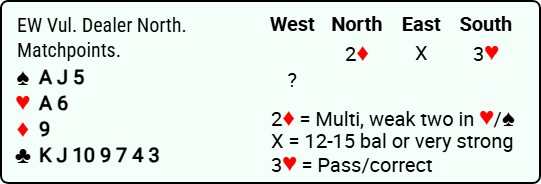
|
ACTION |
MARKS |
PANEL |
Competitors' |
|
6♣ |
10 |
11 |
16 |
|
3NT |
8 |
6 |
17 |
|
Dbl |
7 |
2 |
6 |
|
5♣ |
6 |
4 |
30 |
|
4♣ |
2 |
0 |
27 |
|
4♥ |
2 |
0 |
2 |
|
4NT |
0 |
0 |
2 |
|
3♠ |
0 |
0 |
1 |
|
4♦ |
0 |
0 |
1 |
Competition Entrant Average Score: 5.76
No majority on this one, but the panel does produce a clear favourite. Most of the panel rejected the competitors’ most popular choice, primarily because of the form of scoring. At matchpoints, playing in 5♣ is akin to trying to land on a pinhead, in that it will be right only if you can make exactly 11 tricks and 3NT is making no more than nine tricks. Let’s start with those panelists who chose that option…
JILL MEYERS: 5♣. I am bidding what I have.
ALAN MOULD: 5♣. No idea. I will randomly guess we don't have a slam on.
Even so, is 5♣ really likely to be the best game at matchpoints?
P.O. SUNDELIN: 5♣.
LARRY COHEN: 5♣. An underbid, but I am afraid to try anything partner might misinterpret.
Yes, the problem with this situation is that 3♠, 4♥, Double (and other possible actions) are all open to misinterpretation unless you have specific agreements. That didn’t stop a couple of panelists risking them…
SIMON DE WIJS: Dbl. Double first and bid 5♣ next. Hopefully, this will get partner to raise with the right hands.
WENFEI WANG: Dbl. Showing points, and then I will bid an invitational 5♣ next.
If there is a ‘next’, of course.
The rest of the panel forego science and take a practical stab at what they think (hope) they can make…
MARTY BERGEN: 3NT. Definitely NOT a bid I am proud of.
SALLY BROCK: 3NT. It’s the scoring that made me do it!
LIZ McGOWAN: 3NT. At IMPs, I would give more thought to 5♣.
ROB BRADY: 3NT. Pre-empts work sometimes. 3NT, 5♣ or 6♣ could all be the right spot. Matchpoints compels me to try for the no-trump game.
SARTAJ HANS: 3NT. Playing for the clubs to run is reasonable. And, if they don't, sometimes partner will contribute a heart stopper and sometimes RHO will have only two hearts (at this vulnerability).
Or, opener will have spades, perhaps?
PAUL MARSTON: 3NT. This keeps us in the mix for a good result. I’m not willing to gamble on slam.
But the largest faction on the panel are…
JOEY SILVER: 6♣. We are too high to bid scientifically, so I will take my best shot.
ALEXANDER COOK: 6♣. I am making the practical bid. I don’t see a way of investigating scientifically.

Pragmatism wins the day.
MIGUEL VILLAS-BOAS: 6♣. I don’t have an obvious way to investigate, so 6♣ seems like a sensible shot. When everything is a guess, choose the option with the largest upside if you are right.
Christian thinks he knows how to tell if this is the right thing to do…
CHRISTIAN MARI: 6♣. If Andrew Robson also bids 6♣, that means I am right.
ANDREW ROBSON: 6♣. My best guess - what else?
Well, there you have it!
BARNET SHENKIN: 6♣. 4♣ should be forcing, but I am unwilling to take the risk that partner is not on the same wavelength…
HANOI RONDON: 6♣. Two aces, a seven-card suit and a singleton. You can't ask for more.
VENKATESH RAMARATNAM: 6♣. If intervenor holds as little as Kxxx/xx/AQxxx/Ax, 6♣ should have play. Signing off in 3NT is too pessimistic, and playing in 5♣ will often score poorly at MPs.
MATS NISLAND: 6♣.
PIERRE SCHMIDT & JOANNA ZOCHOWSKA: 6♣. In our methods, after 2♦-Dbl-2/3M, we bid as if the sequence has started with a 1NT opening and the overcall. So, here 1NT-(3♥)-? In this situation, we play 4♦ is a strong transfer to clubs. With no specific agreements, we would take a chance by bidding 6♣. At matchpoints, 5♣ is not an option, as the odds favour making more than nine tricks in 3NT.
DAVID BIRD: 6♣. Yes, this is a slight overbid. If only eleven tricks are available, though, 5♣ might be outscored by 3NT. I would bid only 5♣ at IMPs.
Plenty for regular partnerships to discuss here. Would 4♣ be forcing? What is double? Is 4♥ natural or a cue-bid? Is 3♠ natural or a spade stop for NT?
At the table, partner had Kx/Jxxx/AKx/Qxxx, so 6♣ was an easy make. Playing MPs, 3NT would have scored better than playing in the club game (partner will surely pass if you bid 5♣). This time, opener had spades but, if he has hearts, can partner not hold something like KQx/xxx/AKxx/Qxx? Now 3NT is potentially no play with 6♣ still cold. I think the slam bidders clearly win the debate on this one.
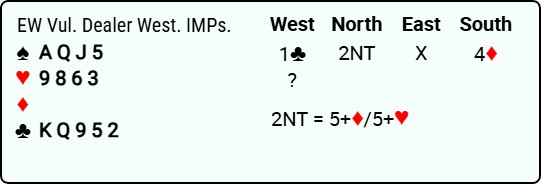
|
ACTION |
MARKS |
PANEL |
Competitors' |
|
4♠ |
10 |
16 |
66 |
|
4♥ |
8 |
1 |
4 |
|
Pass |
7 |
5 |
14 |
|
Dbl |
6 |
1 |
11 |
|
5♣ |
0 |
0 |
4 |
|
5♦ |
0 |
0 |
1 |
Competition Entrant Average Score: 8.56
Maybe I am just out of touch with modern bidding but, for me, partner’s double of 2NT has always said that he wants to double at least one of their suits. Looking at our hand, does it not seem likely that suit is diamonds? A number of the panel seem to have very different agreements, and more than two-thirds of competition entrants seem to agree with them…
MARTY BERGEN: 4♠. What else can I do?
ALAN MOULD: 4♠. A breather at last. What else?
JOEY SILVER: 4♠. Putting on my big boy pants.
You may need them when teammates return, as E.T. could have used this number.
CHRISTIAN MARI: 4♠. It could be the last chance to show my hand.
Paul asks the key question…
PAUL MARSTON: 4♠. What is partner’s double? I would like to think it shows a few useful values, suitable for offence. With defence he should start with pass.
Really? If he wants to defend, can he not double to stop you bidding in front of him?
SALLY BROCK: 4♠. For me (and I think fairly common these days) partner’s double of 2NT shows four spades and not necessarily a huge hand.
PIERRE SCHMIDT & JOANNA ZOCHOWSKA: 4♠. For us, partner’s double promises four cards in spades (or a strong hand suitable for clubs), so this is an easy one.
Andrew is the only one who thinks 4♠ may not be enough.
ANDREW ROBSON: 4♥. I like partner’s double to be negative, guaranteeing spades. I think my 4♥ shows a good 4♠ bid. But, if his double is just general blues, my 4♥ will be pick-a-black-suit. Either way, it’s near-perfect.
Beauty is in the eye of the beholder, I guess.
ROB BRADY: 4♠. I think it's fashionable nowadays to play these doubles as negative, but our partnership hasn't picked up on this trend, I fear. 4♠ should get us to the right black suit game, and I hope it's not too high.
Most of the rest do not tell us what they think partner has shown, but that doesn’t stop them…
SIMON DE WIJS: 4♠. Maybe partner will suspect five spades for this but, with all these concentrated values and a void, I am not making a takeout double.
MATS NISLAND/P.O. SUNDELIN: 4♠.
LARRY COHEN: 4♠. I am not interested in defending over their jump, especially with nothing higher than a nine in their suits. I have a great hand for offense.
We’ll see about that!
MIGUEL VILLAS-BOAS: 4♠. Vulnerable against not, I bid a game. There’s a chance that the opponents will sacrifice.
There is a sacrifice available, but this time you are it.
DAVID BIRD: 4♠. Partner might be itching to double 4♦. Equally, we might have a good spade contract. He will let me know, perhaps loudly, whether I have chosen the right move.
First the opponents will let you know, equally loudly.
VENKATESH RAMARATNAM: 4♠. With my regular partner, after value showing double by responder, we play pass as forcing above the four-level in opener's suit. Even so, with such an offensive hand, it seems right to bid 4♠. This limits our hand, as pass and then 4♠ would show a stronger hand. If not playing pass as forcing, it is tougher, as 4♠ risks overstating our playing strength, but it still seems like the best option.
LIZ McGOWAN: 4♠. I have a bad feeling about this. However, I suspect that, if I pass, partner will double 4♦ and I will be in an even worse position.
At least you will still have a chance of a plus score.
Only a hardy minority deviated from the popular choice on this one. This I have not come across before…
SARTAJ HANS: Dbl. I'm used to playing such doubles for takeout, so this seems ideal.
To me, this just seems normal…
ALEXANDER COOK: Pass. Partner's original double showed an interest in doubling at least one of their suits. My red-suit holdings strongly suggest that he will want to double 4♦, so I’ll give him the chance to do so. This may be our last plus score.
An accurate prediction.

WENFEI WANG: Pass.
HANOI RONDON: Pass. Partner has a penalty double of at least one of their suits. If he can double, that's great. If he can't, he will bid something.
JILL MEYERS: Pass. With my regular partner, I would bid 4♠ because we play the double of 2NT shows four spades. Without that understanding, I don't think I have a bid, particularly with four little hearts.
Barnet starts out on the road to a plus score, but then joins the lemmings…
BARNET SHENKIN: Pass. I will pull double of 4♦ to 4♠ and then cooperate.
When this deal occurred in the final of the Open Teams in Poznan, West bid 4♠. Partner had Kxx/KQJx/QJ10x/xx, so he corrected to 5♣, which was -1100. Unless you have a specific agreement that partner’s double shows spades (as some panelists appear to have), does a double of 2NT not say that he has an interest in defending? 4♦-X was only one down, but a plus is a plus! The two-thirds of competitors who chose 4♠ not only get top marks, but they are in very good company, so perhaps teammates will be understanding.
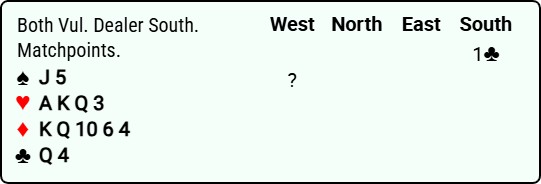
|
ACTION |
MARKS |
PANEL |
Competitors' |
|
1♦ |
10 |
14 |
56 |
|
1NT |
7 |
4 |
7 |
|
Dbl |
7 |
4 |
25 |
|
1♥ |
5 |
1 |
3 |
|
2♦ |
0 |
0 |
4 |
|
2NT |
0 |
0 |
4 |
|
2♣ |
0 |
0 |
1 |
|
3♦ |
0 |
0 |
1 |
Competition Entrant Average Score: 7.99
Four possibilities, but nearly two-thirds of the panel and over half of competition entrants found this one to be an easy 10 marks. Let’s start with the majority…
DAVID BIRD: 1♦. I look forward to hearing of any other action that is half as good as this.
Not this time, David.
MATS NISLAND: 1♦. Downgraded to an overcall.
PAUL MARSTON: 1♦. Let's see what happens.
PIERRE SCHMIDT & JOANNA ZOCHOWSKA: 1♦. Too strong, and no clear club stopper, for 1NT. Not quite a hand on which to double first and bid diamonds next, but close.
Too strong for 1NT? Maybe in France but, I suspect, not in the rest of the world. More to the point perhaps…
JILL MEYERS: 1♦. I have too many points in my two long suits (and not enough in the others) to bid 1NT.
SIMON DE WIJS: 1♦. 1NT would be my alternative. Still, you'd prefer to have a club stopper and 1♦ is also fine.
ALAN MOULD: 1NT. 1♦ or 1NT. I don't care much.
ALEXANDER COOK: 1♦. I don’t think there is any need to distort the hand by bidding 1NT. Most of my points are in my longest two suits and the hand doesn't feel like a no-trump hand. If the auction proceeds (1♠)-Pass-(2♠), I can then double to get my hearts into play.
Agreeing with that…
CHRISTIAN MARI: 1♦. I should be able to show hearts later.
HANOI RONDON: 1♦. We can surely double spades later to show hearts. Bidding hearts first is misguided, and double first is out of the question without spades.

Andrew makes a strong point - what do we expect from this hand?
ANDREW ROBSON: 1♦. I can see a case for 1♥ and 1NT, but why distort? If the deal is a boring diamond part-score, probably the most likely scenario, I need to bid the suit.
JOEY SILVER: 1♦. Since it looks like our side is missing the spade suit, I will play it straight and start with my longest and strongest. This might be my only chance to bid at a reasonable level.
VENKATESH RAMARATNAM: 1♦. We don't have enough to double and voluntarily bid again. My options are a simple 1♦ overcall, hoping to bid again, 1♥ on our good four-card major, or 1NT to show our values. I chose 1♦, not wanting to the distort the hand, although I seriously considered 1NT (lack of stopper in clubs is hardly a deterrent).
ROB BRADY: 1♦. If our hand was weaker, say xx/AKQx/K109xx/xx, I'd have a lot more sympathy for a 1♥ overcall, to direct the opening lead against the opponent's likely spade contract. With 17 HCP, I don't see the need to distort my shape this early.
A number of panelists use the word ‘distort’, so let’s hear from supporters of the alternatives…
SARTAJ HANS: 1NT. We might be missing a stopper, but 1NT shows our values and positions us well for the rest of the auction.
Unless, as Andrew points out, you belong in 2/3♦.
MIGUEL VILLAS-BOAS: 1NT. This seems like the best way to show the strength of my hand. This will also make it harder for the opponents to find a possible fit in spades.
I guess we shouldn’t be surprised to find two old sparring partners of similar opinion…
MARTY BERGEN: 1NT. I have long believed that, after their minor-suit opening, no stopper is needed. The only overcall that is well-defined as to strength is 1NT, so you should strive to make that bid.
LARRY COHEN: 1NT. I am too strong for 1♦ or 1♥, and I don't want to double and then bid, so I will lie a little bit about the club stopper and get the strength and sort of hand off my chest. Matchpoints makes us strive for no-trumps.
I cannot argue with Sally’s point, but…
SALLY BROCK: Dbl. Anything could be right – Pass, 1♦, 1♥, 1NT?
P.O. SUNDELIN: Dbl.
WENFEI WANG: Dbl. I have 17 HCP. If partner responds 1♠, I will bid 1NT.
Wouldn’t that show a hand too strong for a 1NT overcall… ie about 18-20?
BARNET SHENKIN: Dbl. Old style. My good friend Victor Silverstone would have bid 1♥ with confidence.
It must be a Scottish thing, as only Victor’s compatriot opted for that option…
LIZ McGOWAN: 1♥. My partners know that if I rebid a minor I have overcalled in a four-card major.
Partner had Qxxxx/Jxx/xxx/Kx so, as Andrew predicted, you want to play in a red-suit partscore. Overcalling either red suit is likely to achieve that goal. 1NT is unlikely to do so (as partner will, presumably, transfer to spades), and starting with a double certainly makes it more difficult. Another good result for the majority of both the panel and the competitors.
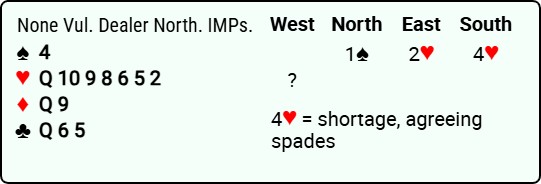
|
ACTION |
MARKS |
PANEL |
Competitors' |
|
5♥ |
10 |
11 |
61 |
|
6♥ |
8 |
6 |
16 |
|
Pass |
8 |
3 |
7 |
|
Dbl |
7 |
1 |
9 |
|
4NT |
6 |
1 |
1 |
|
5♦ |
6 |
1 |
0 |
|
4♠ |
6 |
0 |
3 |
|
7♥ |
6 |
0 |
1 |
|
5♣ |
6 |
0 |
0 |
Competition Entrant Average Score: 8.87
Although this is the deal on which the panel offered the most alternatives this month, two options emerged as clear favourites. By contrast, this proved to be a relatively straightforward hand for competition entrants, with almost two-thirds collecting top marks. On what is essentially a tactical evaluation, most of the options fall into the category of ‘might work’, so everyone scores fairly well. The panel can be divided into three main camps – ‘make them guess’, ‘wait and see what they do’, and ‘try to misdirect’. Let’s deal with them in order…
MATS NISLAND: 6♥. Who knows?
DAVID BIRD: 6♥. Eeny, meeny, mynee, mo... 6♥!
SIMON DE WIJS: 6♥. And lean back and let the other three players decide what to do.
LARRY COHEN: 6♥. I would want to bid this if they settle in 5♠, so I might as well apply some pressure now. I am a little concerned about my queens being too much defense.
MIGUEL VILLAS-BOAS: 6♥. Let’s make them guess. My partner has ♥A-K and probably a king or an ace, so the opponents can probably make 5♠ but, on some layouts, 6♠ will be making. I will bid 6♥ and pass if the opponents guess to bid 6♠.
The other option which falls into the ‘make them guess’ category is a jump to 7♥, although none of the panel went for such a nuclear option.
CHRISTIAN MARI: 6♥. Bidding 5♥ with the plan of leaving them in 5♠, hoping we can make three tricks, is not a good bet, in my opinion.
How about leaving them in 5♠ hoping you can make only one trick…?
WENFEI WANG: 5♥. I take away their space and hope the opponents will stop in 5♠.

P.O. SUNDELIN: 5♥. I am hoping they mis-guess if I give them just enough room to stop out of slam.
HANOI RONDON: 5♥. I think taking this level away is enough. Partner has entered at the two-level, so they don't necessarily have a slam... I hope.
What do we think of our defensive chances?
PAUL MARSTON: 5♥. Taking out their Blackwood. Not more - with both opponents short in hearts, we might make unexpected tricks in the minors.
LIZ McGOWAN: 5♥. Anything could be right. I will defend 5♠ and hope to beat 6♠ if they bid it.
BARNET SHENKIN: 5♥. A gentle raise to take the five-level away from them. I have bits and pieces of defence here.
MARTY BERGEN: 5♥. I am unwilling to bid more than this.
JILL MEYERS: 5♥. Taking away their cue bid, I hope.
SARTAJ HANS: 5♥.
ROB BRADY: 5♥. I hope partner's ruff-sluff on opening lead doesn't let a slam through.
VENKATESH RAMARATNAM: 5♥. Pass/5♥/6♥/7♥ could all work. If opponents are minimum for their actions, they could have slow losers, and my minor-suit queens could be of value. I’ll take the middle of the road option of bidding 5♥, intending to defend if opponents bid on (including 6♠).
How about giving them room to explore in the hope that they will tell you how high to go?
ALEXANDER COOK: Pass. Perhaps this will cause the opponents to misjudge the auction. I can rethink if they get to slam.
JOEY SILVER: Pass. I don't intend to make it easy for the villains by jumping around in hearts. I'll take a wait and see policy intending, of course, to sell to 4♠.
SALLY BROCK: Pass. I’m hoping that if I pass and then bid 5♥, I am more likely to buy it. At least it’s a plan!
ALAN MOULD: Dbl. A daft question really, as anything could be right, including getting partner to NOT lead a heart, as that could easily be a ruff-and-discard. This time I will feign strength and try to buy the hand in 6♥.
The mavericks go for outright mis-direction…
ANDREW ROBSON: 5♦. A bluff lead-director in an to attempt to stop them. I have to try to sow some seeds of confusion.
I do quite like this approach…
PIERRE SCHMIDT & JOANNA ZOCHOWSKA: 4NT. Our intention is to show, theoretically, some defensive values, and (most of all) suggest a non-heart lead (likely ruff and discard). The "post mortem" probably will show that the operation was successful but that the patient died.
This is a tactical decision. At the table I saw, West bid 5♥ and defended 6♠. Declarer had 12 tricks and a diamond guess for 13, which he got wrong, so -980. 7♥-doubled costs 800 and would clearly be a more attractive option against vulnerable opponents. If you bid it immediately, you might get to play there, or they might bid on, giving you a chance of a plus score. Partner had x/AKJxx/xxx/K10xx. Declarer had 109xx opposite AKJx in diamonds, and had to drop your doubleton ♦Q offside to make all 13 tricks.

With a score of 77/80, French legend Christian Mari leads the panel this month. Completing the podium are Marty Bergen and Simon de Wijs, both with scores of 75/80.
Well done to this month’s guest panelists, both of whom return very respectable scores in the 70s.
Our thanks, as always, to all members of the panel.
See you all again next month. Marc
|
Christian MARI |
4♦ |
3NT |
2NT |
4NT |
6♣ |
4♠ |
1♦ |
6♥ |
77 |
|
Marty BERGEN |
4♦ |
3NT |
2NT |
5NT |
3NT |
4♠ |
1NT |
5♥ |
75 |
|
Simon DE WIJS |
4♦ |
3NT |
2NT |
5NT |
Dbl |
4♠ |
1♦ |
6♥ |
75 |
|
Hanoi RONDON |
3♦ |
3NT |
2NT |
5NT |
6♣ |
Pass |
1♦ |
5♥ |
74 |
|
Rob BRADY |
4♦ |
3♥ |
3♦ |
Dbl |
3NT |
4♠ |
1♦ |
5♥ |
73 |
|
Alan MOULD |
4♦ |
3NT |
2NT |
5NT |
5♣ |
4♠ |
1♦ |
Dbl |
73 |
|
David BIRD |
4♠ |
3NT |
3♦ |
5NT |
6♣ |
4♠ |
1♦ |
6♥ |
72 |
|
Venkatesh RAMARATNAM |
4♦ |
3NT |
3NT |
5♥ |
6♣ |
4♠ |
1♦ |
5♥ |
72 |
|
Barnet SHENKIN |
4♦ |
3NT |
3♦ |
4NT |
6♣ |
Pass |
Dbl |
5♥ |
72 |
|
Joey SILVER |
4♦ |
3NT |
2NT |
5♣ |
6♣ |
4♠ |
1♦ |
Pass |
72 |
|
Miguel VILLAS-BOAS |
4♦ |
3NT |
3♦ |
Dbl |
6♣ |
4♠ |
1NT |
6♥ |
72 |
|
Alexander COOK |
4♦ |
3♥ |
2NT |
Dbl |
6♣ |
Pass |
1♦ |
Pass |
71 |
|
Sartaj HANS |
4♦ |
3NT |
2NT |
5NT |
3NT |
Dbl |
1NT |
5♥ |
71 |
|
Pierre SCHMIDT & Joanna ZOCHOWSKA |
4♦ |
3NT |
3♦ |
5♥ |
6♣ |
4♠ |
1♦ |
4NT |
71 |
|
Paul MARSTON |
4♠ |
3NT |
3♦ |
Dbl |
3NT |
4♠ |
1♦ |
5♥ |
70 |
|
Wenfei WANG |
4♦ |
3NT |
2NT |
Dbl |
Dbl |
Pass |
Dbl |
5♥ |
69 |
|
Jill MEYERS |
4♦ |
3NT |
3♦ |
5♥ |
5♣ |
Pass |
1♦ |
5♥ |
68 |
|
Mats NILSLAND |
3♦ |
4♣ |
3♦ |
4NT |
6♣ |
4♠ |
1♦ |
6♥ |
68 |
|
Andrew ROBSON |
4♦ |
4♠ |
2NT |
Dbl |
6♣ |
4♥ |
1♦ |
5♦ |
67 |
|
Sally BROCK |
4♦ |
3NT |
3♣ |
Dbl |
3NT |
4♠ |
Dbl |
Pass |
66 |
|
Liz McGOWAN |
4♦ |
3NT |
Pass |
4NT |
3NT |
4♠ |
1♥ |
5♥ |
66 |
|
Larry COHEN |
4♠ |
3NT |
3♦ |
5NT |
5♣ |
4♠ |
1NT |
6♥ |
65 |
|
P.-O. SUNDELIN |
4♠ |
3NT |
2NT |
5♣ |
5♣ |
4♠ |
Dbl |
5♥ |
62 |
|
|
|
|
|
|
|
|
|
|
|
|
TOP SCORE |
4♦ |
3NT |
2NT |
5NT |
6♣ |
4♠ |
1♦ |
5♥ |
|
|
HAND 1: |
4♦ 10 |
3♦ 7 |
4♠ 5 |
3♠ 2 |
|
|
HAND 2: |
3NT 10 |
3♥ 8 |
4♣/4♠ 5 |
5♦ 4 |
|
|
HAND 3: |
2NT 10 |
3♦ 9 |
3NT 6 |
3♣ 5 |
Pass 4 |
|
HAND 4: |
5NT 10 |
4NT 9 |
Dbl 8 |
5♥ 6 |
4♠/5♣ 4 |
|
HAND 5: |
6♣ 10 |
3NT 8 |
Dbl 7 |
5♣ 6 |
4♣/4♥ 2 |
|
HAND 6: |
4♠ 10 |
4♥ 8 |
Pass 7 |
Dbl 6 |
|
|
HAND 7: |
1♦ 10 |
1NT/Dbl 7 |
1♥ 5 |
|
|
|
HAND 8: |
5♥ 10 |
6♥/Pass 8 |
Dbl 7 |
4♠/4NT/5♣/ |
|
|
HAND 1: |
3.37 |
|
HAND 2: |
7.31 |
|
HAND 3: |
6.51 |
|
HAND 4: |
6.50 |
|
HAND 5: |
5.76 |
|
HAND 6: |
8.56 |
|
HAND 7: |
7.99 |
|
HAND 8: |
8.87 |